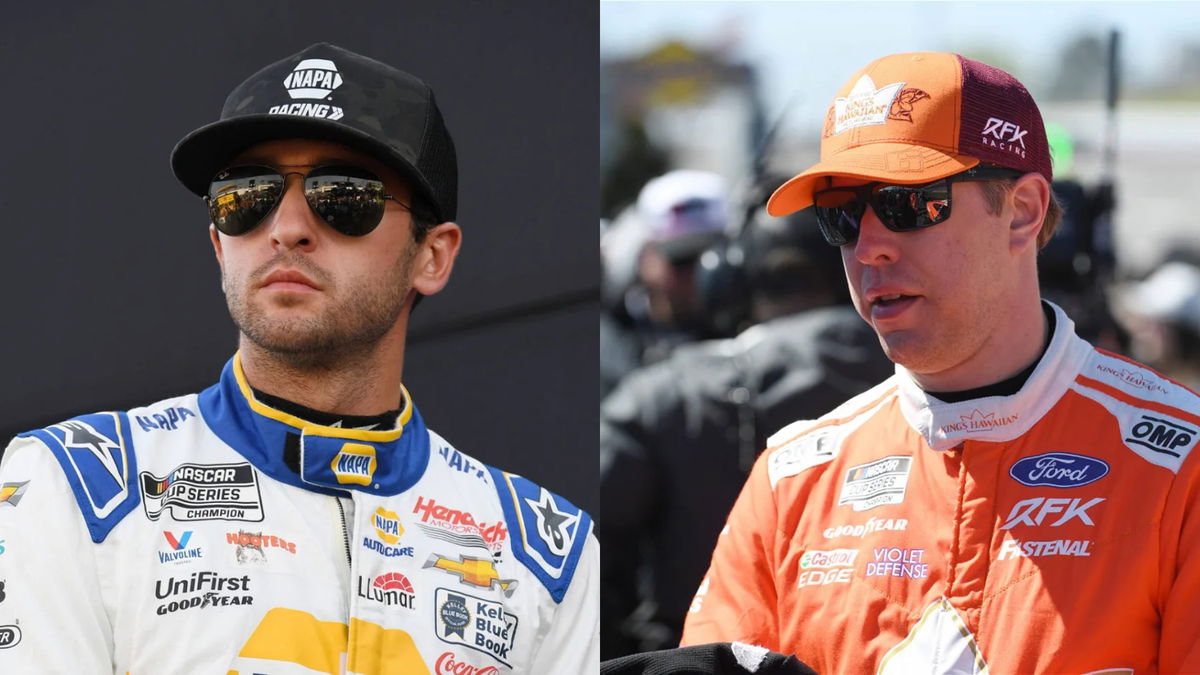
Imago
Image Credits: Imago

Imago
Image Credits: Imago
NASCAR drivers and people working in this industry hardly get time off. Out of the 12 months in a year, NASCAR is running on all four wheels through 10 of those. MLB, with an 8-month long season, is the only closest rival to the premier stock car racing division in terms of season duration. However, the 2024 season allowed the drivers, the teams, and everyone in the sport to have a good two-week break, thanks to the Olympics.
Watch What’s Trending Now!
It wasn’t a decision taken by the governing body but rather forced by the broadcasters who were committed to the Olympics coverage. This two-week hiatus from the racetrack planted the seed of a new idea for permanent summer breaks in NASCAR. Brad Keselowski and Kevin Harvick Now, Chase Elliott has joined them with his ideas and learnings from the NCAA football
ADVERTISEMENT
Chase Elliott advises NASCAR to learn a thing or two from college football
The college football season kicks off in August and concludes its regular season by December. The knockouts and the high-voltage games are wrapped up by January. All in all, a six-month packed schedule for the fans with an equal amount of waiting time for the start of the new season. Now, it is hard to see that NASCAR cut down on the number of races or bring up radical changes to its already debated schedule. But Chase Elliott feels tweaks can be made to the current system that makes the sport more exciting for the fans.
The HMS star was asked by Jeff Gluck about the teaching NASCAR can take from college football. To which Chase Elliott replied, “I think they do a lot of things well. I mean, we’ve talked about this, but I think the first thing is the length of the season. They get a lot in, and when I say length of the season, I’m not necessarily talking about number of races. But just the amount of calendar year that you burn in doing it.” Elliott said this on a special on-track segment of The Teardown show on September 11.
NASCAR could do a lot worse than to consider a shorter compact season. NASCAR’s season is longer than any major motorsport in terms of events held. The 2023 season had only one off-weekend during the regular season if we don’t count the weekend off between The Clash at the Coliseum and the Daytona 500.
ADVERTISEMENT
At the start, NASCAR used to have 50 races in a year before the schedule was reduced to 31 races per year in 1972. Till 1996 there were between 28 and 31 races per year on the schedule. This allowed a whopping eight off-weekends throughout the schedule. This meant the drivers and the teams had reasonable time between races to recuperate and test new equipment. However, the long wait between races also led to multiple weekends where there were no races.
So, in order to overcome this, NASCAR settled on the current 36-38 race schedule in 2001 with two weekends off per season. Though this means fans have a race to look forward to almost every other weekend, it is hectic for the drivers.
ADVERTISEMENT
Adding further on his college football analogy, Elliot said, “Their season is fairly short right and when it rolls back around, it’s exciting. It’s been waiting all year for this, and I think that’s cool, and our sport could use a little more of man I missed that. I really wish there was a race on this weekend. That sucks that it is not, but when it does come back. I’m going to be really fired up to watch it. I think that’s healthy.”

ADVERTISEMENT
Right now we have 38 events on 40 weekends in a season that starts in February and ends in November. The situation is compounded by the fact that there are 10 tracks that NASCAR visits twice per season. In 2024, we have Daytona, Atlanta, Las Vegas, Phoenix, Bristol, Richmond, Martinsville, Talladega, Kansas, and Darlington, tracks that have two events per season.
A way for NASCAR to reduce the schedule will be to cancel the second trips to the aforementioned tracks. This would immediately bring the schedule down to 26 races and allow them to explore new venues. But a shorter season also comes with its drawbacks from a business point of view.
ADVERTISEMENT
Simple logic dictates that more races mean more money for NASCAR. It also means more resources can go to race teams, track upgrades, prize pools, etc. In addition to this, NASCAR signed a seven-year media rights deal which will begin in 2025 worth $7.7 billion with FOX Sports, NBC, Amazon, and TNT Sports. So any decision to reduce the number of races will have to either wait till 2031 or can lead to a reduction in the annual $1.1 billion NASCAR will receive.
Chase Elliot has long been an advocate for change in NASCAR’s schedule. In August, he talked to The Athletic and answered a question about what he would like to change about NASCAR. Referencing college football’s schedule he said, “When I look at our schedule, we could really take some of that and put it in our corner as an extremely positive thing for a lot of reasons. One, you’re giving the people who really make the show go on — which are the teams — a chance to have a life at home, which is going to make them a happier person when they come to the racetrack. It’s going to make the fans want us to be back on track with more excitement and more joy.”
Meanwhile, the pot was also stirred by Brad Keselowski and Kevin Harvick when they discussed the idea of a permanent mid-season break in NASCAR.
ADVERTISEMENT
Top Stories
Ross Chastain Labels NASCAR Driver “The Most Punchable Face” to Excuse Himself Over Punchgate Controversy

Jeff Gordon’s NASCAR Rival Issues Public Verdict Years After His Apology

Richard Childress’ Champion Driver Joins Forces with HMS Crew Chief to Make Last Minute Chili Bowl Entry

Ross Chastain Recalls the Relentless Grind That Kept His NASCAR Dream Alive After Sponsorship Spin-off

Commissioner Steve Phelps Quits NASCAR Days After Getting Exposed in Lawsuit Trial

Keselowski said he has brought up the idea of a break with other team owners
NASCAR went into a two-week break following the July 21 race in Indianapolis and returned to action on August 11 in Richmond. Discussing this break on Harvick’s Happy Hour on Fox on June 20, Harvick said, “I think that there needs to be some sort of break in the middle of the year for the employees. You guys as owners need to get together and say, ‘Okay, we need to take (at least) one week off.’ Everybody has to lock those doors so that those employees can say, ‘I’m going on vacation.’”
Keselowski said that he took up the idea with other team owners but it was shot down. He mentioned that he brought up the idea of “an industry shutdown.”
ADVERTISEMENT
“So I made a really hard push to the other team owners like, ‘Hey, let’s all get together and shutdown. We’ll all just kind of lock our doors for a week or two, all the employees go home, go on vacation, go spend some time with your kids, refresh, and kind of reload for what is the final half of the season.’ Unfortunately, that kind of fell on some deaf ears, but I think it’s something that our sport needs to really, really consider,” he added.
Even though it appears that a shorter schedule may not be on NASCAR’s agenda pretty soon, with more professional suggesting a change, it will be valuable for the organization to at least consider the possibility.
ADVERTISEMENT
ADVERTISEMENT
ADVERTISEMENT

